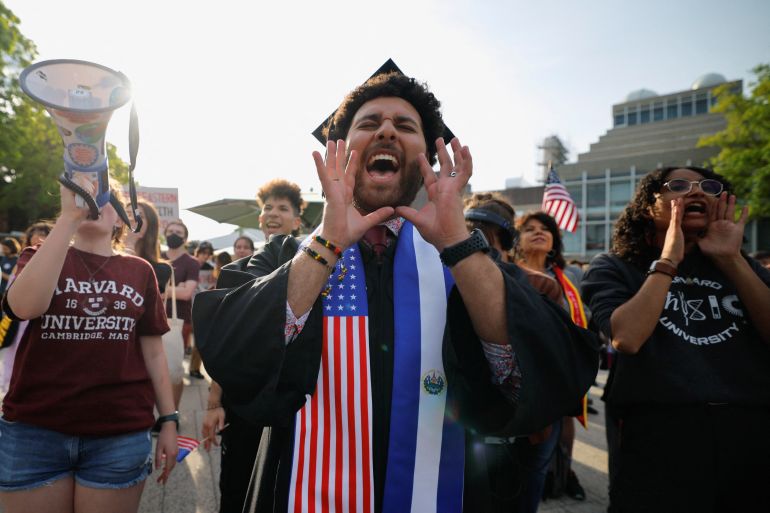United States moves to restrict visa length for foreign students, reporters
The Trump administration has proposed restricting student visas to a four-year period rather than the duration of programme.

Published On 28 Aug 202528 Aug 2025
The administration of United States President Donald Trump is planning to shorten the amount of time foreign students, culture exchange participants and journalists are allowed to stay in the US.
The Department of Homeland Security (DHS) said on Wednesday that the changes are necessary to crack down on “visa abuse” and facilitate the government’s ability to “vet and oversee” foreign visa holders.
Recommended Stories
list of 3 itemsend of list
“For too long, past Administrations have allowed foreign students and other visa holders to remain in the U.S. virtually indefinitely, posing safety risks, costing untold amount of taxpayer dollars, and disadvantaging U.S. citizens,” an unnamed DHS spokesperson said in a news release.
The proposed time caps come as the Trump administration seeks to place greater restrictions on all forms of immigration.
The three types of visas that would be affected are F visas for students, which would be limited to four years; J visas for cultural exchange, also limited to four years; and I visas for reporters, which would be limited to 240 days rather than covering the length of employment, with the chance to extend.
Journalists from China would be limited to just 90 days in the country.
Up to now, student visas have been typically issued for the duration of an academic programme. But Wednesday’s proposal has prompted fears that international students could be disadvantaged by the time restrictions.
While four years is the length of a typical undergraduate university programme in the US, some PhD programmes can last longer. Research opportunities, changes in degree track, and other circumstances can also affect the time it takes to complete an academic diploma.
Advertisement
Foreign students also play an outsized role in the financing of US higher education, since they are often subjected to higher fees than their US counterparts.
About 1.6 million international students were studying in the US on an F visa in 2024.
But the Trump administration accused international students of using their visas to stay in the country indefinitely.
“Foreign students have taken advantage of US generosity and have become ‘forever’ students, perpetually enrolled in higher education courses to remain in the US,” the DHS said in its news release.
The Trump administration has sought to place foreign students under greater government scrutiny. Earlier this year, it also announced it was temporarily suspending all student visa applications. When appointments began again in June, the administration said it would increase monitoring of social media activity during the application process.
Thousands of student visas have also been revoked since Trump took office for a second term in January.
Some have been rescinded as a result of student participation in political activity such as pro-Palestine protests.
In one example, the administration arrested and moved to deport a Turkish PhD student named Rumeysa Ozturk after she co-authored an op-ed in her student newspaper calling for her campus to sever ties with Israel amid that country’s devastating war in Gaza.
After a legal battle, Ozturk was released from an immigration detention facility in May, but her case remains ongoing, and she continues to face the possibility of deportation.
In Wednesday’s announcement, DHS said the new time caps would encourage visa-holders to apply to extend their stay, thereby allowing for the department to conduct “regular assessments” to weigh their continued stay in the US.
